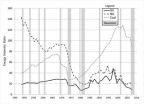(Press-News.org) CORAL GABLES, FL (December 7, 2010)— Previous research has shown that when women are in their most fertile phase they become more attracted to certain qualities such as manly faces, masculine voices and competitive abilities. A new study by University of Miami (UM) Psychologist Debra Lieberman and her collaborators offers new insight into female sexuality by showing that women also avoid certain traits when they are fertile.
The new study shows that women avoid their fathers during periods of peak fertility. The findings are included in a study entitled "Kin Affiliation Across the Ovulatory Cycle: Females Avoid Fathers When Fertile" available online in December in the journal Psychological Science, a prominent peer-reviewed scholarly journal.
Women stay away from male relatives when they are most fertile for evolutionary reasons, explains Lieberman assistant professor in the Department of Psychology at UM and the study's lead author. "Evolutionary biologists have found that females in other species avoid social interactions with male kin during periods of high fertility," said Lieberman. "The behavior has long been explained as a means of avoiding inbreeding and the negative consequences associated with it. But until we conducted our study, nobody knew whether a similar pattern occurred in women."
For the study, the researchers examined the cell phone records of 48 women in their reproductive years. They noted the date and duration of all calls with their fathers and separately, their mothers over the course of one billing period. They then identified the span of days comprising each woman's high and low fertility days within that billing period.
"Women call their dads less frequently on these high-fertility days and they hang up with them sooner if their dads initiate a call," said Martie Haselton, a UCLA associate professor of communication in whose lab the research was conducted. Women were about half as likely to call their fathers during the high fertility days of their cycle as they were to call them during low fertility days. Women's fertility had no impact, however, on the likelihood of their fathers calling them. Women also talked to their fathers for less time at high fertility, regardless of who initiated the call, talking only an average of 1.7 minutes per day at high fertility compared to 3.4 minutes per day at low fertility.
The researchers concede that the high-fertile women might simply be avoiding their fathers because fathers might be keeping (too close) an eye on potential male suitors. But their data cast some doubt on this possibility. It is more likely, they conclude, that like females in other species, women have built-in psychological mechanisms that help protect against the risk of producing less healthy children, which tends to occur when close genetic relatives mate.
"In humans, women are only fertile for a short window of time within their menstrual cycle," Lieberman said. "Sexual decisions during this time are critical as they could lead to pregnancy and the long-term commitment of raising a child. For this reason, it makes sense that women would reduce their interactions with male genetic relatives, who are undesirable mates."
The reluctance to engage in conversations with fathers could not be attributed to an impulse to avoid all parental control during ovulation. In fact, the researchers found that women actually increased their calling to their mothers during this period of their cycle, and that this pattern was strongest for women who felt emotionally closer to their moms. At high fertility, women proved to be four times as likely to call their mothers as they were to phone their fathers, a difference that did not exist during the low fertility days. In addition, women spent an average of 4.7 minutes per day on the phone with their mothers during high fertility days, compared to 4.2 minutes per day during low-fertility.
One possible explanation is that women call their moms for relationship advice, said Elizabeth Pillsworth, who also contributed to the study.
"They might be using mothers as sounding boards for possible mating decisions they're contemplating at this time of their cycle," said Pillsworth, an assistant professor of evolutionary anthropology at California State University, Fullerton. "Moms have a lot more experience than they do. Particularly for those women who are close to their mothers, we can imagine them saying, 'Hey Mom, I just met this cute guy, what do you think?'"
Either way, the findings show that women are unconsciously driven during their most fertile periods to behavior that increases the odds of reproducing and doing so with the right mate, said Haselton.
"This suggests that although human culture has in many ways changed at a rapid pace, our every day decisions are often still tied to ancient factors affecting survival and reproduction," says Haselton. "We think of ourselves as being emancipated from the biological forces that drive animal behavior. But, that's not completely true," she says. "These kinds of findings show us that a complete understanding of human behavior needs to involve these biological forces. Humans are, after all, mammals."
###
The University of Miami's mission is to educate and nurture students, to create knowledge, and to provide service to our community and beyond. Committed to excellence and proud of the diversity of our University family, we strive to develop future leaders of our nation and the world. www.miami.edu
Evolutionary psychology: Why daughters don't call their dads
2010-11-30
ELSE PRESS RELEASES FROM THIS DATE:
U of I scientists develop tool to trace metabolism of cancer-fighting tomato compounds
2010-11-30
URBANA – The University of Illinois scientists who linked eating tomatoes with a reduced risk of prostate cancer have developed a tool that will help them trace the metabolism of tomato carotenoids in the human body. And they've secured funding from the National Institutes of Health to do it.
"Scientists believe that carotenoids—the pigments that give the red, yellow, and orange colors to some fruits and vegetables—provide the cancer-preventive benefits in tomatoes, but we don't know exactly how it happens," said John W. Erdman, a U of I professor of human nutrition.
The ...
Moderate alcohol consumption lowers the risk of metabolic diseases
2010-11-30
With the emergence of an epidemic of obesity and type 2 diabetes (DM) throughout the world, the association of lifestyle habits that may affect the risk of metabolic diseases is especially important. Most prospective studies have shown that moderate drinkers tend to have about 30% lower risk of developing late onset diabetes than do non-drinkers, and moderate drinkers also tend to be at lower risk of developing metabolic syndrome (MS). A cross-sectional analysis of 6172 subjects age 35 -75 in Switzerland related varying levels of alcohol intake to the presence of DM, ...
Contact with dads drops when women ovulate
2010-11-30
Through an innovative use of cell phone records, researchers at UCLA, the University of Miami and Cal State, Fullerton, have found that women appear to avoid contact with their fathers during ovulation.
"Women call their dads less frequently on these high-fertility days and they hang up with them sooner if their dads initiate a call," said Martie Haselton, a UCLA associate professor of communication in whose lab the research was conducted.
Because they did not have access to the content of the calls, the researchers are not able to say for sure why ovulating women ...
Duke scientists look deeper for coal ash hazards
2010-11-30
DURHAM, N.C. – As the U.S. Environmental Protection Agency weighs whether to define coal ash as hazardous waste, a Duke University study identifies new monitoring protocols and insights that can help investigators more accurately measure and predict the ecological impacts of coal ash contaminants.
"The take-away lesson is we need to change how and where we look for coal ash contaminants," says Avner Vengosh, professor of geochemistry and water quality at Duke's Nicholas School of the Environment. "Risks to water quality and aquatic life don't end with surface water contamination, ...
Marsupial embryo jumps ahead in development
2010-11-30
DURHAM, N.C. – Long a staple of nature documentaries, the somewhat bizarre development of a grub-like pink marsupial embryo outside the mother's womb is curious in another way.
Duke University researchers have found that the developmental program executed by the marsupial embryo runs in a different order than the program executed by virtually every other vertebrate animal.
"The limbs are at a different place in the entire timeline," said Anna Keyte, a postdoctoral biology researcher at Duke who did this work as part of her doctoral dissertation. "They begin development ...
Apes unwilling to gamble when odds are uncertain
2010-11-30
DURHAM, N.C. -- Humans are known to play it safe in a situation when they aren't sure of the odds, or don't have confidence in their judgments. We don't like to choose the unknown.
And new evidence from a Duke University study is showing that chimpanzees and bonobos, our closest living primate relatives, treat the problem the same way we do.
In studies conducted at the Tchimpounga Chimpanzee Sanctuary in Republic of Congo and Lola ya Bonobo Sanctuary in Democratic Republic of Congo, researchers found the apes prefer to play it safe when the odds are uncertain.
Graduate ...
New tool to measure quality of patient care
2010-11-30
A national conversation continues about the best ways to improve both the quality of medical care and to contain costs. So far, developing quality measurements has focused on primary care or highly prevalent, chronic conditions such as asthma and diabetes. But what about brain disorders? To date, the number of measures that apply to neurologic care has been limited.
The American Academy of Neurology (AAN), an association of more than 22,500 neurologists and neuroscience professionals, reached out to a group of neurologists to develop such a set of measurements. Led ...
Chemistry for greenhouse gases
2010-11-30
If fossil fuels burn completely, the end products are carbon dioxide and water. Today the carbon dioxide is a waste product, one that goes into the air — adding to global warming; or the oceans — acidifying them; or underground — with as yet unknown consequences.
But it's not impossible, says Liviu M. Mirica, PhD, assistant professor of chemistry at Washington University in St. Louis, to drive things the other way, turning carbon dioxide into fuels such as methanol or hydrocarbons.
Until now reversing combustion has been a loser's game, because making carbon dioxide ...
Declining energy quality could be root cause of current recession
2010-11-30
An overlooked cause of the economic recession in the U.S. is a decade long decline in the quality of the nation's energy supply, often measured as the amount of energy we get out for a given energy input, says energy expert Carey King of The University of Texas at Austin.
Many economists have pointed to a bursting real estate bubble as the initial trigger for the current recession, which in turn caused global investments in U.S. real estate to turn sour and drag down the global economy. King suggests the real estate bubble burst because individuals were forced to pay ...
Women with migraine with aura have better outcomes after stroke
2010-11-30
DALLAS, Nov. 29, 2010 — Women with a history of migraine headache with aura (transient neurological symptoms, mostly visual impairments) are at increased risk of stroke. However, according to new research reported in Circulation: Journal of the American Heart Association stroke events in women with migraine with aura are more likely to have mild or no disability compared to those without migraine.
In a new analysis of the Women's Health Study involving 27,852 women over 13.5 years, researchers found those who have migraine with aura and who experience an ischemic stroke ...

